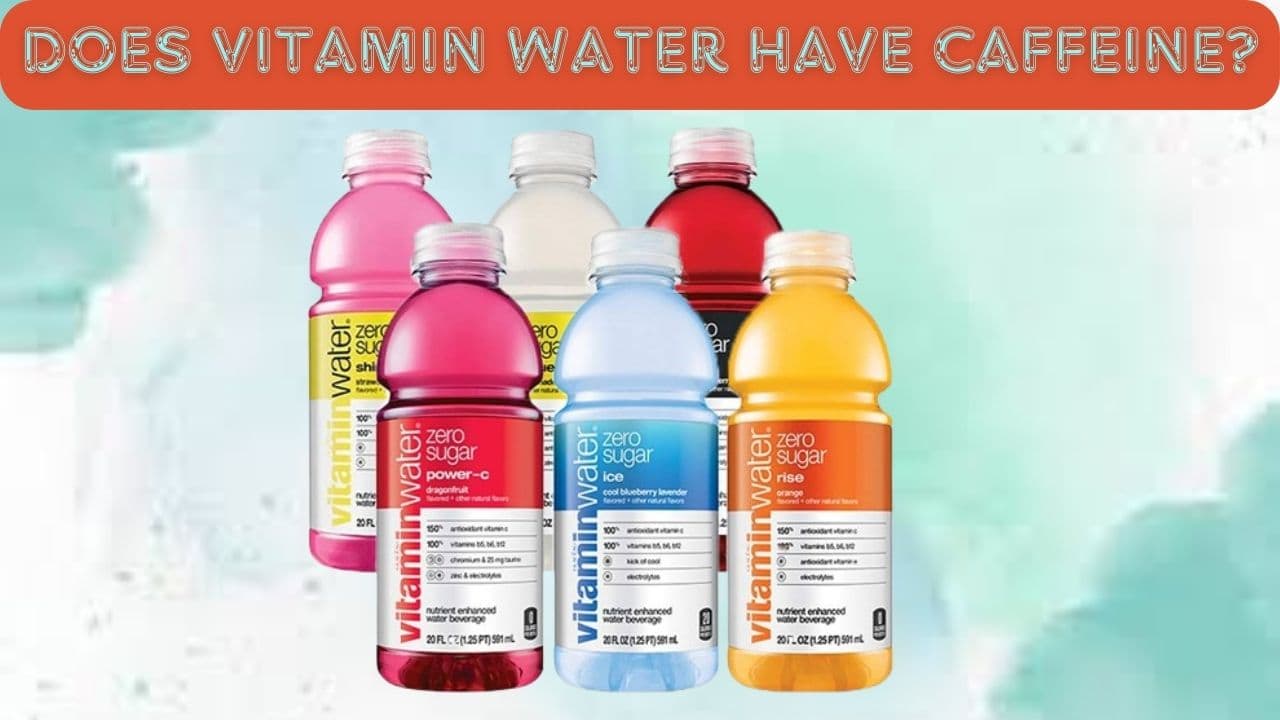Vitamin Water is a popular drink for those seeking a boost of hydration along with essential vitamins. But when it comes to caffeine, people are often left wondering: Does Vitamin Water have caffeine? Knowing whether your drink contains caffeine can make a huge difference, especially if you’re sensitive to it or trying to limit your intake.
In this article, we’ll dive deep into the world of Vitamin Water and uncover whether you need to worry about caffeine when you pick up a bottle.
Table of Contents
What is Vitamin Water?
Vitamin Water, as the name suggests, is a water-based beverage infused with various vitamins and minerals. It’s marketed as a healthier alternative to sugary sodas, offering both hydration and a nutritional boost. The brand behind Vitamin Water is Coca-Cola, and they have made it available in a wide range of flavors, each designed to address different health and hydration needs.
Why People Choose Vitamin Water
For many, Vitamin Water represents a middle ground between plain water and sugary soft drinks. It provides hydration with the added benefit of vitamins such as vitamin C, vitamin B, and electrolytes like potassium. The drink appeals to health-conscious individuals who want something a little more flavorful than regular water but aren’t keen on the high-calorie content of many other beverages.
Does Vitamin Water Contain Caffeine?
Does Vitamin Water have caffeine? The short answer is: most Vitamin Water varieties do not contain caffeine. The standard Vitamin Water lineup, including flavors like Power-C, Revive, and XXX, is caffeine-free. This makes it a great option for people who want to stay hydrated without the added stimulant.
Caffeine-Free Varieties of Vitamin Water
The majority of Vitamin Water options are caffeine-free. Some of the most popular caffeine-free flavors include:
- Vitamin Water XXX (Acai-Blueberry-Pomegranate)
- Vitamin Water Power-C (Dragonfruit)
- Vitamin Water Focus (Kiwi-Strawberry)
- Vitamin Water Revive (Fruit Punch)
These flavors are well-loved for their taste and their vitamin-packed benefits, all without adding caffeine into the mix.
Are There Any Caffeinated Versions of Vitamin Water?
Yes, while most of the product line is caffeine-free, Vitamin Water Energy is an exception. This specific line was introduced for those seeking a hydration boost and a caffeine kick. Vitamin Water Energy combines vitamins and electrolytes with caffeine, making it a hybrid between an energy drink and a vitamin-infused water.
Caffeine Content in Vitamin Water Energy
So, how much caffeine is in Vitamin Water Energy? A standard 20-ounce bottle contains about 50 mg of caffeine. For comparison, this is less than a typical cup of coffee, which contains around 95 mg, but more than many soft drinks. It’s a mild amount of caffeine, designed to give you a gentle boost of energy without the jitters associated with stronger caffeinated beverages.
What Are the Effects of Caffeine in Vitamin Water?
Caffeine works by stimulating the central nervous system, which can increase alertness and reduce fatigue. The caffeine content in Vitamin Water Energy is relatively low, so while you might feel more awake and focused after drinking it, it won’t cause the same intense energy surge that stronger energy drinks or coffee might.
How Much Caffeine Is Safe in a Day?
The FDA recommends that adults consume no more than 400 mg of caffeine per day, which is about four or five cups of coffee. Since Vitamin Water Energy contains only 50 mg per bottle, it’s a fairly safe choice even if you’re keeping an eye on your overall caffeine intake.
Vitamin Water Nutritional Information
Each variant of Vitamin Water has different nutritional values based on its specific formulation. Below is a general example of the nutritional information you can expect from a standard 20 oz bottle of Vitamin Water. Does Vitamin Water have caffeine?
| Nutrition Facts | Amount per Serving |
|---|---|
| Calories | 120 |
| Total Carbohydrates | 32g |
| Sugars | 32g |
| Vitamin C | 100% Daily Value |
| Vitamin B3 (Niacin) | 25% Daily Value |
| Vitamin B5 (Pantothenic Acid) | 25% Daily Value |
| Vitamin B6 | 25% Daily Value |
| Vitamin B12 | 25% Daily Value |
| Potassium | 60 mg |
| Calcium | 10 mg |
Do You Know?
👉 Is Ghost Energy Drink Good for You?
List of Ingredients in Vitamin Water
Vitamin Water is designed to offer both hydration and added vitamins, but what exactly goes into each bottle? Here’s a breakdown of some common ingredients found in Vitamin Water:
- Filtered Water: The base of all Vitamin Water beverages, ensuring hydration.
- Crystalline Fructose: A sweetener derived from corn, providing the sweetness in many Vitamin Water varieties.
- Cane Sugar: Another natural sweetener used to enhance flavor.
- Electrolytes: Ingredients like potassium and calcium are added to help balance fluids in the body.
- Vitamins: Each variant includes a blend of vitamins, such as:
- Vitamin C: Known for boosting the immune system.
- Vitamin B3 (Niacin): Helps with energy metabolism.
- Vitamin B5 (Pantothenic Acid): Essential for synthesizing coenzyme A.
- Vitamin B6: Supports brain health and energy levels.
- Vitamin B12: Key for maintaining nerve and blood cells.
- Natural Flavors: To enhance the taste of each variant.
- Citric Acid: Used to add tartness and act as a preservative.
- Coloring: Natural or artificial dyes, depending on the flavor, give the drink its distinct look.
Who Should Avoid Caffeinated Vitamin Water?
Although Vitamin Water Energy contains a relatively small amount of caffeine, there are some groups who should avoid or limit their caffeine intake, including:
- Pregnant women: caffeine consumption should be limited during pregnancy.
- Children and adolescents: Their bodies are more sensitive to caffeine.
- People with caffeine sensitivity: Those who experience jitters or anxiety from small amounts of caffeine. Does Vitamin Water have caffeine?
Alternatives to Vitamin Water
If you’re looking for alternatives to Vitamin Water, there are several options available, each with varying caffeine content. Below are six alternatives explained with their caffeine levels.
Gatorade Zero
Gatorade Zero is an electrolyte drink that offers hydration without sugar or caffeine. It’s a go-to for athletes and those seeking to replenish fluids after exercise. Since it’s caffeine-free, it’s ideal for people who want hydration without the stimulant effect.
BodyArmor Lyte
BodyArmor Lyte is a low-calorie, electrolyte-infused beverage that is free from caffeine. It contains coconut water, vitamins, and minerals to support hydration. This option is perfect for anyone looking for a flavorful yet caffeine-free alternative to Vitamin Water.
Propel Electrolyte Water
Made by Gatorade, Propel provides electrolytes and vitamins without caffeine or sugar. It’s a suitable alternative for those focused on staying hydrated while avoiding both sugar and stimulants.
Bai Antioxidant Water
Bai is known for its antioxidant-infused drinks that contain small amounts of caffeine—usually around 30-35 mg per bottle. It’s a low-caffeine alternative if you’re looking for hydration with a slight energy boost.
Smartwater +
Smartwater + is an enhanced water option that includes electrolytes and vitamins but no caffeine. It’s a premium alternative for those who prefer a simple, clean hydration solution.
Hint Water
Hint Water is a flavored water brand that contains no sweeteners, no calories, and no caffeine. It’s a light and refreshing option for those who want something simple and hydrating without any additives.
| Alternatives | Caffeine Content |
|---|---|
| Gatorade Zero | 0 mg |
| BodyArmor Lyte | 0 mg |
| Propel Electrolyte Water | 0 mg |
| Bai Antioxidant Water | 30-35 mg |
| Smartwater + | 0 mg |
| Hint Water | 0 mg |
Do You Know?
👉Does Dunkin Refresher Have Caffeine?
Health Benefits of Drinking Vitamin Water
Vitamin Water isn’t just about hydration – it also provides various vitamins, including B vitamins (B3, B5, B6, B12), which can aid in energy production, and vitamin C, which boosts the immune system. Additionally, some variants contain electrolytes like potassium and calcium, which help maintain fluid balance in the body.
Potential Downsides of Drinking Vitamin Water
Despite its health benefits, Vitamin Water does have some potential downsides. One of the primary concerns is its sugar content. Some flavors contain up to 32 grams of sugar per bottle, which is close to the daily recommended limit. Additionally, the use of artificial sweeteners in some varieties may be a concern for certain people.
Should You Include Vitamin Water in Your Diet?
In moderation, vitamin water can be a part of a healthy diet, especially if you choose flavors with lower sugar content. However, it’s important to consider your overall dietary needs and how much-added sugar you’re consuming in other foods and beverages.
Recommended Daily Intake of Vitamin Water
There’s no strict recommendation on how much Vitamin Water one should drink daily. However, it’s important to consider the sugar content in most variants. For example, if you are watching your sugar intake, limiting yourself to one bottle a day might be advisable. This is particularly true for those who are also consuming other sugary foods or drinks throughout the day.
For individuals looking for daily hydration, plain water or Vitamin Water Zero, which has no sugar, might be a better option for regular consumption. As with any flavored beverage, it’s best to consume Vitamin Water in moderation and alongside other hydrating drinks like water.
Conclusion
Does Vitamin Water have caffeine? To sum up, most Vitamin Water varieties are caffeine-free, making them a great option for those seeking hydration and vitamins without the stimulant.
However, Vitamin Water Energy does contain caffeine, offering a moderate boost for those who want it. Whether or not Vitamin Water fits into your diet depends on your personal health goals, but it can be a refreshing way to stay hydrated and get a few extra vitamins along the way.
FAQS
1. Does Vitamin Water Have caffeine?
No, most Vitamin Water flavors do not contain caffeine. However, always check the label as some energy or enhanced varieties may include small amounts of caffeine. For the majority of its products, Vitamin Water is caffeine-free.
2. Is Vitamin Water a good energy drink alternative?
Vitamin Water is not specifically designed to be an energy drink. While it provides vitamins and hydration, it lacks the high caffeine levels typically found in energy drinks. Some enhanced versions may contain caffeine, but it’s much lower compared to energy drinks.
3. Can Vitamin Water help with hydration?
Yes, Vitamin Water helps with hydration, especially because it contains electrolytes and water as its main ingredient. However, for best hydration, choosing a caffeine-free variety is ideal, as caffeine can have mild dehydrating effects.
4. Is Vitamin Water healthier than soda?
Vitamin Water generally has fewer sugars and provides added vitamins compared to soda. However, some varieties still contain significant sugar, so it’s important to check the label and consume in moderation.
5. Does Vitamin Water actually hydrate you?
Yes, Vitamin Water does hydrate, particularly because it is primarily water-based and contains electrolytes. Caffeine-free versions provide the best hydration without the diuretic effect of caffeine.

